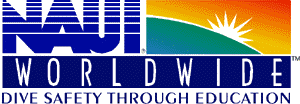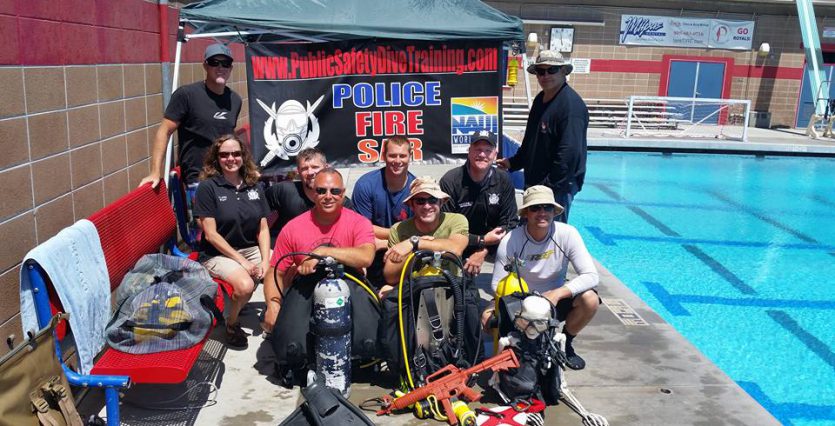It’s 2 o’clock in the morning. You’re miserable and cold. Large raindrops strike your face. The air temperature is barely above freezing. You’re standing on the pitching deck of the boat as swells roll it back and forth, up and down. A helicopter hovers overhead, its rotor wash whipping up frigid wind and mist as its searchlight hits the black water.
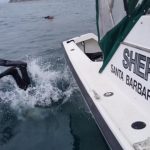
There’s a small, private airplane down there, somewhere down there, reported having hit the water an hour ago. The water is cold and dark, and a light sheen of oil can be seen on the surface with bits of flotsam. All gear checks have been completed. Pulling your mask onto your face and taking a breath, you hear: “Divers in the water.” You step off the deck into the water. It’s just another night in the life of the public safety diver (PSD).
Got your attention?
The above may be exciting and dramatic, but it isn’t real. It’s a combination of reality and some artistic license. The more likely reality is that you are sitting in the conference room at the law offices of Dewey, Cheatem & Howe (a nod to “Car Talk”) answering interminable questions about an incident that happened 22 months ago, and your every word is being recorded by a stenographer, tapping away on the machine. The questions are repetitive, in-depth, and at times seem to have nothing to do with the dive.
As scuba instructors, we are professionals, and by legal definition, experts in our field. Once in the realm of public safety diving, you open the door to legal aspects of the dive industry that few may find familiar. Did you record your actions on that dive? Did you videotape or photograph anything? How accurate are your records or notes? These are all things to consider as an instructor teaching this highly specialized and oftentimes dangerous portion of police work.
As soon as humans began using water for transportation, recreation or any other reason, such as concealment or destruction of evidence, the divers who performed PSD roles have required higher levels of training than recreational divers. NAUI Instructors have been training divers for technical, professional and government roles since our beginning. Teaching public safety diving is a multilayered specialty.
The history of public safety diving is one of growth. The role was brought about by necessity. Police officers, sheriff’s deputies, and firefighters were tasked with entering water environments to accomplish necessary tasks. As time passed and technology progressed, their roles became more complex, and using recreationally trained divers was no longer a safe option. Teams that had been operating for years began to look at their training and decide that better training meant safer as well as better divers. Budgets, personnel safety and time were all factors to consider when it came to training a dive team.
With the demands and potential risks of this field being so high, the initial training and subsequent continuing education need to be specific and demanding. Like learning to drive, the basics of being behind the wheel are often taught by a parent or family friend though the best place to learn how to drive is a combination of a professional driving school and experience. Only after the proper training and added experience do we get a safe, qualified driver. Taking that a step further, someone who has been driving many years has little understanding of what it’s like to sit behind the wheel of a police car. When it comes to the demands of police driving, it’s a completely different world. Finer skills of racing, (entry, apex, the exit of turns, high-speed maneuvering) are something that the average driver will never need or master.
When teaching a PSD course, one uses portions of several diving courses: advanced, rescue, master diver and divemaster, along with tech, salvage and nitrox diving, plus their years of experience working as a public safety officer.
Larger departments may be required to deploy divers in a wide variety of circumstances with an immense array of gear, including full-face masks, closed-circuit rebreathers, surface-supplied and “hard-hat” diving. The environments these divers may encounter can be open-ocean, altitude, currents, under ice or zero visibility. A wide variety of environments is typical of a larger department with a large area of responsibility.
NAUI Instructors hone their craft and fine-tune their teaching during years of diving experience. Once we leave the recreational arena and enter the world of the PSD, the learning curve becomes steeper still.
There’s nothing recreational about recovering lost loved ones or documenting a tragedy. Attention to detail and ability to recall seemingly insignificant events are subject to being examined — often in excruciating detail. When I decided to start teaching public safety diving in 2011, I sat down and wrote out my own textbook. I often request feedback and evaluation from students or clients to improve my courses. Without feedback, your program is not going to grow. With every change in gear or updated technique, I will edit and update the book. The NAUI Public Safety Diver course is designed to provide a rock-solid foundation for training and be dynamic with the main focus of creating the best possible and safest divers.
Identifying goals
We begin by identifying a problem. Problems that occur during training or during real operations can be used to develop training protocols. Evaluation of an incident is a valuable tool to identify what went wrong and provide insights into addressing issues divers may face. The next step is to create realistic, challenging and safe training. Putting divers through rigorous drills, pushing their limits of comfort while ensuring there are adequate safety measures in place should a diver experience trouble is the best way to build confident, safer divers.
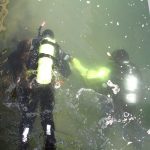
In the early days, law enforcement training was filled with “no-win” scenarios to test an officer’s ability when confronted with failure. Later, the concept was identified as questionable: while it may be a test of character, it did nothing to teach and reinforce the best way to handle situations. During my courses, I will test and challenge a diver’s abilities and push them, while maintaining a safe environment. While there may be a “no-win” scenario, the goal is to get candidates to recognize it before attempting to solve it. There is rarely only one solution to a problem.
Challenging divers with an “entanglement tunnel” or teaching them to retrieve their alternate air source without the use of their hands are just two of the skills I cover. When a challenging skill becomes second nature, I’ll increase the difficulty, moving to more complexity, such as wearing blacked-out masks. We must strive to present effective training courses that create the best possible diver.
Staffing a course with excellent assistants whom you can trust is also important to the success of any course.
There are many different public safety agencies and many different environmental demands. Being able to fit the needs of individual agencies requires a flexible course that can be adjusted to fit the needs of a particular department. In-service training workshops for dive teams in the surrounding area can be a fantastic way of introducing yourself, your program and your ability to teach these very close-knit groups.
The tasks or missions associated with public safety diving are along the lines of searches, recoveries, and salvage. Further, we must incorporate training in evidence recovery and preservation. There is little “wiggle room” when it comes to recovering evidence. How the divers locate, recover and document is all subject to future scrutiny. When the training that public safety divers received comes into the equation — and it will — their instructor must be prepared to identify the steps taken to train them. There’s a saying common in police training: “tools in a toolbox,” meaning any job requires a set of appropriate tools. When it comes to dive operations, we are training our students to use the tools that will be available when needed. The more tools they have, the easier the job will be. What the diver did and why it was done will be subject to the inquiry should something go wrong.
Police officers are used to being in the courtroom. There’s a difference between being deposed and being questioned as a witness (giving testimony), though typically both are administered under oath. Giving a deposition in a civil matter is typically done in a law office, whereas testimony is given in the courtroom on the witness stand. Giving credible, well-investigated testimony is a critical component of a public safety diver’s world. Any diver who enters the water to recover an item is subject to having their actions examined through deposition or subpoena.
Our teaching must address the big picture, the role of the dive supervisor, who is responsible for the entire dive operation and the crime scene overall. The “zone” concept, the managing of resources and ensuring all divers on the scene have received the proper training, have the proper equipment required to perform the tasks and get the job done are all a part of the world of public safety diving.
As the instructor, these are all facets of the NAUI Public Safety Diver certification course, and all require an ongoing commitment to keep each course taught up to date. As with any training, starting with the basics and working up to the more complex is the best approach. The goal is to provide realistic, safe and challenging training, and it’s reflected in our mantra, or hashtag: “Where Leaders Dive.”
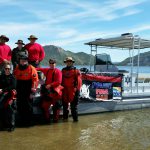
Each and every NAUI Instructor, whether teaching public safety, tech, or recreational scuba is promoting, educating, and instilling the value that great training makes great divers. I will tell anyone that being a NAUI Instructor was one of the best choices I ever made, and with that comes great responsibility — train the best, safest divers one can.
Innovative ideas, new techniques, and brainstorming are great ways to improve our courses. I’ve read many posts and articles from other NAUI Instructors who are trying new things and posting their work on social media. Granted, sometimes a new idea doesn’t work so well: I’ve certainly had my share of those. But without striving to be the best, we’ll never improve. When our abilities and methods grow and improve, the training process better for it.
=============================
Michael Sieverman is a retired senior police officer. He has been teaching the NAUI Public Safety Diver course since 2012 and is one of the committee members responsible for authoring the NAUI course standards. He teaches both NAUI PSD and recreational courses in Southern California. Additional information regarding his courses can be found on his member page or visiting PublicSafetyDiveTraining.com
